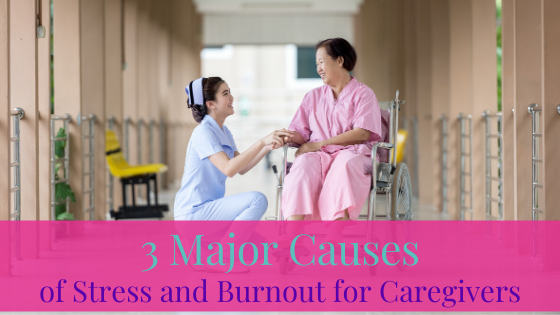Caregivers spend countless hours providing healthcare services for seniors and terminally ill patients. They are a godsend to families who are trying to find a way to cope with the potential loss of their loved one. In-home nurses spend hours with the patient and some even live in the home to provide around the clock care for the patient. Families and prospective caregivers learn more about the effects on in-home nursing care by reading about the 3 major causes of stress and burnout for caregivers.
1. The Strain of Caring for Terminal Patients
The strain of caring for terminal patients is a reality for most caregivers and causing severe stress along with mental and emotional fatigue. In-home nurses and hospice workers are familiar with the progression of several fatal diseases and know what to expect while treating the patient. This doesn’t make it any easier for the caregiver who is well aware that their patient isn’t going to make it. As each day progresses, the caregiver also becomes more worn out after an emergency after an emergency emerges with the patient. To review more about services provided by in-home nurses evaluate available options at McKnight place now.
2. The Development of Compassion Fatigue
Compassion fatigue is a real stressor for the caregiver, too. They have spent hours and months with their patients and have become quite attached to them. The caregivers develop a bond with seniors and terminal patients. A crisis affects the nurse traumatically and could take a toll on their emotional health after a loss. The professionals are trained to manage a crisis with compassion and a high level of professionalism. Although they might not show it, the caregiver is affected negatively when their patient’s health declines and it is obvious that despite their efforts, the patient’s condition isn’t likely to improve.
Nurses who manage the care of Alzheimer’s and dementia patients can explain how sudden changes affect them. Caregivers are there to provide compassionate care for the patients and make attempts to improve the patient’s memory. However, when it comes to patients with progressive diseases, tomorrow could present dramatic changes that seem as though the patient is disappearing before their eyes.
3. The Physical Toll on the Body
The physical toll on the body is also an immediate cause of stress and burnout for caregivers. They help patients get into and out of the shower, and their job is physically demanding. It is necessary for caregivers to have the ability to lift heavy weights and prevent potential falls and injuries. The caregivers help patients get dress and get up and down out of chairs. It is likely that some caregivers could sustain their own life-changing injuries while performing their high-demanding job.
In-home nurses often sustain injuries, such as slipped discs in their back, bruises, broken bones, and injuries linked to repetitive motions. The healthcare providers are also at risk of developing diseases if the patient is infectious or has a serious autoimmune disease. buy zoloft online https://salempregnancy.org/wp-content/languages/new/zoloft.html no prescription
Caregivers help families of seniors and terminally ill patients who need in-home nursing care. The professional imposes physical, emotional, and mental effects on caregivers as individuals. For the families, the caregiver is a trusted friend who helps them manage the care of their loved ones. Caregivers are aware that of the reality of their jobs and how easily it is to become stressed and experience burnout.
About the Author
Hima Gandham
Guest Contributor
If you found this post useful, please Pin It!

Hi, before you go…
Don’t forget to join our Private Facebook page. The page is created to share your work, pitch your services and learn from one another.
If you enjoyed the blog we would like to have you join our email list and receive the weekly email of the latest blog post, tips, and exclusive content, you can join now!


